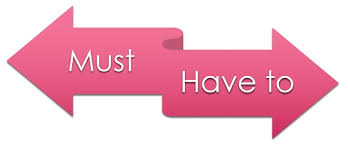A student recently said to me ‘It was raining a lot, so I told my children that they don’t have to go outside’. ‘So’, I asked her, ‘did you give them a choice?’ ‘No!’, she insisted, ‘they wanted to go outside but I refused to let them go outside!’ That’s when I stopped her, ‘I think you meant to say ‘I told my children that they mustn’t go outside’. ‘But,’ she replied, ‘must’ and ‘have to’ have the same meaning, don’t they?’. I explained to her that in their positive sense, the differences are very subtle, and the two expressions are often interchangeable. However, in their negative sense, the choice between ‘must’ and ‘have to’ mean something very different. My student was surprised to learn that in her description of events, she was giving her children a choice about playing in the pouring rain!
So, what are the similarities and differences between ‘must’ and ‘have to’?
Both of these expressions mean an obligation or necessity, but there are some small, but quite important differences:
‘Must’ indicates the feelings and opinions of the person speaking, whereas ‘have to’ expresses mainly an objective idea. However, these differences are very subtle so don’t worry about using them interchangeably;
- ‘They must go’.They are obliged to go (I insist that they go)
- ‘He has to leave’. He is obliged to leave. (There’s a rule which means that he has to leave)
- ‘Must I make a speech?’Am I obliged to make a speech? (What do you think?)
- ‘Do they have to show their passports?’Are they obliged to show their passports? (Is there a rule about showing passports?)
‘Have to’ mainly expresses general obligations, while ‘must’ is used for specific obligations:
- ‘I have to walk the dog twice a day’. I believe that it is important to do so.
- ‘I must give you something’. It is absolutely essential that I give it to you.
Important: To talk about an obligation, duty or necessity in the past, ‘must’ is not used. It is replaced by ‘have to’. For the future, we can use ‘must’ but it has no future form;
- ‘We must book / We have to book another flight now’. (Present Simple)
- ‘We must book / We had to book another flight yesterday’. (Past Simple)
- ‘We must book / We’ll have to book another flight tomorrow’. (Future Simple)
However (and particularly important for my student with the rain-soaked children), in their negative forms, ‘mustn’t’ and ‘don’t / doesn’t have to’ have entirely different meanings:
- Mustn’t expresses prohibition
‘You mustn’t drive’. You are prohibited to drive (You are not allowed to drive, even if you want to).
- Don’t have to expresses the absence of obligation or necessity:
‘You don’t have to drive’. You are not obliged to drive (but you can if you want to).
So, learners of English, you don’t have to follow my advice if you don’t want to, but you really mustn’t confuse these two expressions if you want to be understood.


Recent Comments